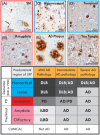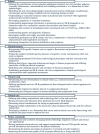Implications and opportunities regarding biological frameworks in overt and prodromal dementia with Lewy bodies
- PMID: 40684248
- PMCID: PMC12276075
- DOI: 10.1002/alz.70470
Implications and opportunities regarding biological frameworks in overt and prodromal dementia with Lewy bodies
Abstract
Dementia with Lewy bodies (DLB), a progressive neurodegenerative disease with heterogeneous clinical presentations, greatly impacts patients, caregivers, and society. Despite its frequency, diagnosing and treating DLB remains challenging. Advances in in vivo biomarker assays reflecting underlying pathology are improving disease identification, diagnostic accuracy, and therapeutic development for biologically targeted, disease-modifying agents. Consequently, definitions of Alzheimer's disease and Parkinson's disease (PD) have shifted to focus on pathological changes occurring before clinical features, with proposed frameworks for detecting pathological amyloid and tau, neurodegeneration, and other markers (National Institute on Aging-Alzheimer's Association) and alpha-synucleinopathy and dopaminergic degeneration (Neuronal α-synuclein Disease Integrated Staging System, SynNeurGe). The biological frameworks, particularly those related to alpha-synuclein (α-synuclein), have sparked debate about unifying DLB and PD under a single pathobiologic disease. This paper discusses the implications of these biological frameworks for the DLB community, addressing topics regarding multiple pathologies and neurochemical systems, clinical heterogeneity, and functional impairment, and exploring the potential impact on clinical trials and care. HIGHLIGHTS: DLB is a progressive neurodegenerative disease with varied clinical presentations. Diagnosing and treating DLB remains challenging despite its frequency. Biological frameworks are reshaping Alzheimer's and Parkinson's definitions. In vivo biomarkers are improving DLB identification and diagnostic accuracy. Debate exists regarding unifying DLB and Parkinson's under one pathobiology.
Keywords: Lewy body dementia; Parkinson's disease dementia; Parkinsonism; amyloid; biomarkers; cognitive impairment; prodromal; synuclein.
© 2025 Lewy Body Dementia Association and The Author(s). Alzheimer's & Dementia published by Wiley Periodicals LLC on behalf of Alzheimer's Association. This article has been contributed to by U.S. Government employees and their work is in the public domain in the USA.
Conflict of interest statement
Jennifer G. Goldman, MD, MS, has received grant/research support from Acadia, Michael J. Fox Foundation; honoraria from International Parkinson Disease and Movement Disorders Society, Parkinson's Foundation, and Parkinson Study Group; and consulting fees from EIP Pharma/CervoMed, GE Healthcare, KeifeRx, Lewy Body Dementia Association, InMuneBio, and SAGE. Dag Aarsland has received research support and/or honoraria from AstraZeneca, H. Lundbeck, Novartis Pharmaceuticals, Evonik, Roche Diagnostics, GE Health, and Sanofi; and served as paid consultant for H. Lundbeck, Eisai, Heptares, Mentis Cura, Eli Lilly, Cognetivity, Enterin, Acadia, EIP Pharma, Biogen, and Takeda. Frederic Blanc, MD, PhD was the national coordinator for France for the Eisai Delphia (E2027), Axovant Headway‐DLB, Roche Graduate, and EIP Pharma/CervoMed therapeutic trials; he has received honoraria from Roche, Eisai, and Biogen for oral presentations and from Eisai and Novo‐Nordisk for serving on a board; and grant support from National PHRC, Inter‐regional PHRC, Memento cohort, Vaincre Alzheimer, Alzheimer Research Foundation, and A2MCL. Bradley F. Boeve, MD, has received honoraria for SAB activities for the Tau Consortium, funded by the Rainwater Charitable Foundation; institutional research grant support for clinical trials from Alector, Transposon, Cognition Therapeutics, and EIP Pharma/CervoMed; and grant support from NIH (P30 AG062677, U01 NS100620, U19 AG071754), Lewy Body Dementia Association, American Brain Foundation, Mayo Clinic Dorothy and Harry T. Mangurian Jr. Lewy Body Dementia Program, the Little Family Foundation, the Ted Turner and Family Foundation. Douglas Galasko, MD, has received consulting fees from Eisai, Inc., GE Healthcare, and Artery Therapeutics and grant support from NIH U01NS100610, P30AG062429, and the Michael J. Fox Foundation. James E. Galvin, MD, MPH, receives grants from the US National Institutes of Health (NIH) (U01 AG084528, T32 AG081170, P30 AG059295, R01 AG078214, RF1 AG075901, R56 AG074889, R01 AG071514, R01 AG071643, R01 AG069765, R01 AG057681, R01 NS101483) and Lewy Body Dementia Association. He is the Chief Scientific Officer for Cognivue, Inc., and receives consulting fees. He is a consultant for Biogen, Beckman‐Coulter, BMS, Cognition Therapeutics, CervoMed, Eisai, Eli Lilly, GE Healthcare, Lobe Sciences, Lundbeck, and Roche. Glenda Halliday, PhD, has received grant/research support from Aligning Science Across Parkinson's, Defeat MSA Canada and Australia‐New Zealand, National Health and Medical Research Council of Australia, NIH, Michael J. Fox Foundation for Parkinson's Research, and Medical Research Future Fund of Australia Australian Parkinson's Mission; Royalties from Elsevier, Academic Press, and Oxford University Press; consulting fees from the Australian Government Department of Health and Aged Care and National Health and Medical Research Council; support for attending meetings from International Parkinson Disease and Movement Disorders Society, Australian Academy of Science, New Zealand Winter Brain Conference, Fight Parkinson's, and University of Tasmania; owns stock in Cochlear Pty Ltd and NIB Health Insurance. Manabu Ikeda, MD, PhD, has received grant support from Eisai, Otsuka, Sumitomo, and Takeda as the chairman of the department; grant from MHLW Program (Grant Number JPMH20CA2088), the Health Labour Sciences Research Grant (grant number:22GB1001), Innovation Platform for Society 5.0 at MEXT, Japan; honoraria from Eisai, Otsuka, Sumitomo, Lilly, Kowa; consulting fees from Otsuka, Ono, Lilly, Shionogi, K‐pharma, and Novo Nordisk. Kejal Kantarci, MD, MS, has received grant support from the NIH (P30 AG062677, U01 NS100620, U19 AG071754, and R01 NS124065) and ADDF and received research support from Eli Lilly. She consults for Biogen without personal compensation. Afina W. Lemstra, MD, PhD, has received institutional grant support from Hersenstichting, Gieske Strijbis Fonds, Stichting Dioraphte, Combinostics, and Michael J. Fox Foundation. Iracema Leroi, MD, has received grant support from the European Commission, the Health Research Board (Ireland), and the Irish Research Foundation, as well as honoraria from Boeringher, Roche, and Novo Nordisk. James B. Leverenz, MD, has received grant/research support from the NIH (NIA, National Institute of Neurological Disorders and Stroke), Lewy Body Dementia Association, Michael J. Fox Foundation, GE Healthcare, and Amprion. Simon Lewis, FRCP, MD, is supported by a National Health and Medical Research Council Leadership Fellowship (1195830) and has received research funding from the Michael J. Fox Foundation and the Australian Research Council, as well as honoraria from International Parkinson Disease and Movement Disorders Society, and the Parkinson's Foundation and consulting fees from Pharmaxis Ltd. Irene Litvan, MD, is supported by NIH grants U01NS112010, U01NS100610, R01AG063911, R61NS141119‐01; U01NS112010; P30AG062429‐06; and R25NS10893; the Michael J. Fox Foundation, Parkinson's Foundation, Lewy Body Dementia Association, CurePSP, Roche, AbbVie, Lundbeck, EIP‐Pharma, Alterity, Novartis, and UCB. She is a member of the scientific advisory board of the Rossy PSP Program at the University of Toronto, Aprinoia, and Amydis. She receives her salary from the University of California, San Diego, and is the Chief Editor of
Figures
Similar articles
-
SynNeurGe: The road ahead for a biological definition of Parkinson's disease.J Parkinsons Dis. 2025 Aug;15(5):931-938. doi: 10.1177/1877718X241298194. Epub 2024 Dec 8. J Parkinsons Dis. 2025. PMID: 39973492 Review.
-
Tissue Factor and Its Cerebrospinal Fluid Protein Profiles in Parkinson's Disease.J Parkinsons Dis. 2024;14(7):1405-1416. doi: 10.3233/JPD-240115. J Parkinsons Dis. 2024. PMID: 39240648 Free PMC article.
-
Cholinesterase inhibitors for dementia with Lewy bodies, Parkinson's disease dementia and cognitive impairment in Parkinson's disease.Cochrane Database Syst Rev. 2012 Mar 14;2012(3):CD006504. doi: 10.1002/14651858.CD006504.pub2. Cochrane Database Syst Rev. 2012. PMID: 22419314 Free PMC article.
-
Streamlined alpha-synuclein RT-QuIC assay for various biospecimens in Parkinson's disease and dementia with Lewy bodies.Acta Neuropathol Commun. 2021 Apr 7;9(1):62. doi: 10.1186/s40478-021-01175-w. Acta Neuropathol Commun. 2021. PMID: 33827706 Free PMC article.
-
Autoantibody profiles in Alzheimer´s, Parkinson´s, and dementia with Lewy bodies: altered IgG affinity and IgG/IgM/IgA responses to alpha-synuclein, amyloid-beta, and tau in disease-specific pathological patterns.J Neuroinflammation. 2024 Dec 3;21(1):317. doi: 10.1186/s12974-024-03293-3. J Neuroinflammation. 2024. PMID: 39627772 Free PMC article.
References
Publication types
MeSH terms
Substances
Grants and funding
LinkOut - more resources
Full Text Sources
Medical



